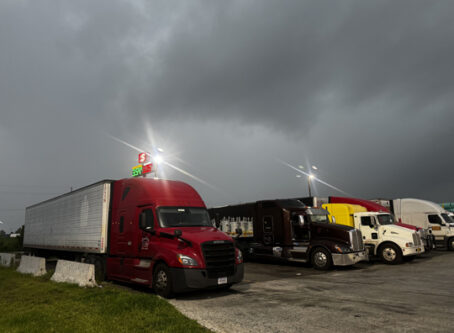Colorado lawmakers advance to governor revised commercial vehicle rules
Work is complete at the Colorado statehouse for a bipartisan pursuit to implement additional rules for commercial vehicles traveling in the state. The Owner-Operator Independent Drivers Association has concerns about the legislation.
The Senate voted to agree to House changes to a bill, SB100, that focuses on truck chain rules, left lane travel and speed enforcement. It now heads to the governor’s desk.
Sen. Dylan Roberts, D-Frisco, has touted the bill as enhancing the safety of commercial vehicles on Colorado’s highways during the winter months.
The Colorado Department of Transportation supports the bill. The agency has said commercial vehicles traveling through Glenwood Canyon account for 57% of winter closures on Interstate 70. The agency attributes many incidents to unchained trucks.
Chain law
Existing state law allows CDOT to issue closures or require certain equipment such as tire chains on I-70 from Sept. 1 through May 31 each year. The rule applies for the stretch of interstate between milepost 133 in Dotsero and milepost 259 in Morrison.
SB100 would revise the rule to state that commercial vehicles weighing at least 16,000 pounds are required to carry chains when traveling on I-70 west of Morrison, on Interstate 25 or on any interstate, U.S. highway or state highway west of I-25.
Roberts said the change would help make sure truck drivers are prepared.
CDOT previously told lawmakers the legislative pursuit follows continued chain violations, commercial vehicle accidents and unnecessary highway closures.
Rep. Rick Taggart, R-Grand Junction, said during House floor discussion that a year ago, Glenwood Canyon was closed nearly 35 days.
“We can’t afford that. We have to have that canyon be open,” Taggart said. “We need our commercial carriers to understand it is critical that they stay in the right lane and they need to adhere to the speed limit.”
He added that corners in the canyon are “tight.”
“When they have an accident, they close the entire two lanes in one direction or another,” he said.
Chain-up areas
Another provision calls for examining the economic and safety impacts of truck incidents and closures during inclement weather, including evaluating the potential benefits to trucks of closures for limited periods during snowstorms.
A study also would be commissioned by CDOT to determine where to build more chain stations in the affected areas. An awareness campaign would be required to inform travelers of the new rules and restrictions.
Advocates have said the revisions are a welcome change and that trucks from outside the region are not as prepared as some of the local motor carriers who deal with snow on a routine basis.
The state highway department also would be required to study the feasibility of increasing the number of chain-up and chain-down stations. The intention is to help ensure that commercial vehicles have necessary equipment and needed rest before traveling the state’s roadways.
Money from increased penalties in Glenwood Canyon would be tapped to help fund additional chain-up and chain-down areas.
Trucking industry weighs in
Greg Fulton of the Colorado Motor Carriers Association told a House committee it is a shared responsibility between the state and motor carriers for safety and mobility in the corridor.
He said the state is responsible for creating a safe environment where truck drivers actually have parking and can put chains on “so we can be safe and others can be safe.”
Fulton highlighted the shortage of truck parking in the state. He said the problem is exacerbated when winter conditions make it difficult for travel, and truckers who would rather not travel must do so due to parking shortages.
Doug Morris, OOIDA director of state government affairs, said it is good to see that Colorado recognizes the need for additional chain locations.
However, he also noted that targeting commercial vehicles for speeding and double fines “is a typical money grab from the state.”
Morris added that he is certain the trucking industry already has paid for the chain locations through taxes, fees and tolls. He questioned how the state utilizes existing transportation revenues.
Left lane rule
Left lane use for commercial vehicles traveling along multiple stretches of I-70 is another topic covered in the bill. Trucks already are prohibited from traveling in the left lane along I-70 through Glenwood Canyon.
SB100 would bar trucks weighing at least 16,000 pounds from the far-left lane on Floyd Hill, Georgetown Hill, the Eisenhower Tunnel, Dowd Junction and Vail Pass. The restriction would apply on stretches of highway with at least three lanes traveling in one direction.
Violators would face fines up to $100.
A revision made in the House would permit trucks to pass in the far-left lane.
Advocates have said revised truck rules that include lane restrictions are needed to improve safety.
Speed limit enforcement zones
One more provision would create commercial vehicle speed limit enforcement zones in Glenwood Canyon. Affected stretches of I-70 eastbound would be between milepost 116 and milepost 131. Westbound truck traffic between milepost 118.5 and milepost 131 also would be included.
Speeding fines for trucks in the zones would be double.
The areas are described in the bill as “where there are safety concerns related to commercial motor vehicle drivers exceeding the posted speed limits.”
Morris has questioned the need for the enforcement zones. He said there are no studies showing increased accidents in the area or indicating trucks are the main cause of accidents. LL









